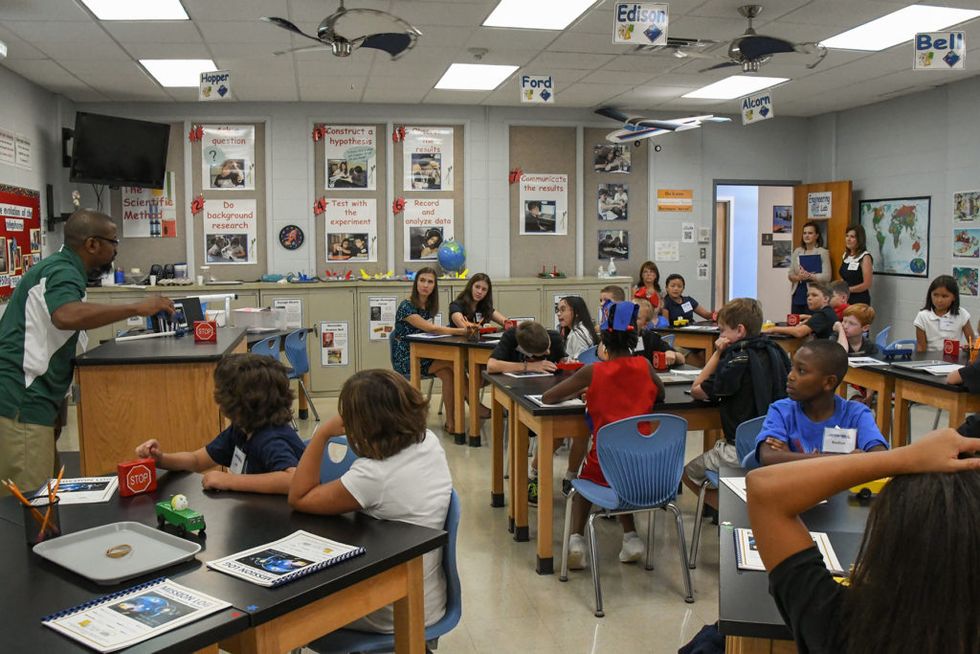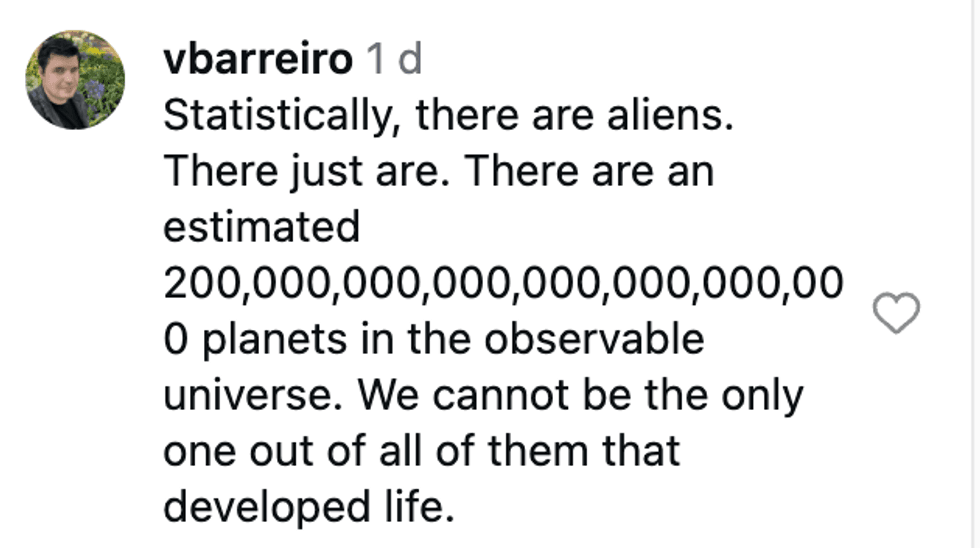If the GOP gets its way in Arizona, students at public and charter schools will no longer learn about evolution in science class. A new draft revision of state science standards replaces the scientific term “evolution” in the curriculum with the phrase “theory of evolution,” which serves to diminish its relevance and dismiss the vast body of evidence that supports it.
The proposed new standards address the origins of life in its Life Sciences section: “The theory of evolution seeks to make clear the unity and diversity of living and extinct organisms,” says the document, which was developed by more than 100 teachers, parents and community members, but then revised, allegedly to the liking of State Superintendent of Education Diane Douglas. Many of the revisions can be seen as visible corrections on the draft.
Teachers are alarmed, including those who worked for more than a year on the new standards, only to see ideological interference in the final draft. One teacher quit over the issue. “I was directed to make changes to adjust the wording to 'evolution,'" said Lacey Wieser, a former high school biology teacher. "That was coming from levels above me, I believe, from the superintendent’s office. I turned in my resignation and said, 'I will not be part of this.'"
Scientists and science-minded parents are also alarmed because the word “theory” appears to dismiss evolution as just a theory. However, evolution has been proven through fossil records and DNA analysis and long-accepted as fact by the scientific community. Microevolution, a branch of evolution that studies changes within species over time, has been confirmed by tests in the laboratory and in the field, such as Peter and Rosemary Grant’s studies of evolving beak shapes among Galapagos finches. Researchers who study viruses and diseases watch evolution—the process by which organisms evolve and adapt to survive through natural selection—happen in a rapid timeframe. (This enables viruses to become resistant to drugs or vaccinations, for example.)
Instead of scientific information, Superintendent Douglas and four of the five candidates for her position, up for reelection in the fall, would prefer that students learn about “intelligent design.” Intelligent design is a science-y sounding rebranding of creationism, an ideologically motivated pseudoscientific theory that an intelligent being created humans and other living beings, and placed them, fully formed and relatively modern, on the planet. Douglas says that she would not force the teaching of creationism in the schools, even though she was heard saying that she would like to at an event. “Should the theory of intelligent design be taught along with the theory of evolution? Absolutely,” she said.
“The recording of me talking about Intelligent Design was taken at a political function where I expressed my personal belief that Intelligent Design should be taught along with the theory of evolution. Although that is my personal belief, my belief is not included in the Arizona Science Standards,” she said.
The Secular Coalition for Arizona has raised concerns about the interference by religion in public education, noting that such interests breach the wall between church and state. "As taxpayer-funded institutions, public schools are constitutionally obligated to teach a religiously neutral curriculum based on the best available evidence and science," said Tory Roberg, coalition director of government affairs for the Secular Coalition for Arizona and a parent of two students. "Intelligent design is a religious ideology and has no place in science class."
In 1987, the U.S. Supreme Court ruled the teaching of creationism in public schools was unconstitutional, a violation of the separation between church and state. Thirteen years ago, a federal judge in Pennsylvania rejected public-school instruction on intelligent design as unconstitutional, because it is a religious viewpoint that advances "a particular version of Christianity."
"Parents like me should be concerned because our kids need to be prepared to compete in a scientifically sound world," Roberg said. "Colleges and universities use evolutionary basics and build on this in advanced science classes. We can't give our kids a second-rate education. We must demand the best."
The public was invited to voice their opinion on the revisions through an online survey. However, in the days leading up to the deadline for public comments, the website that hosted that survey led to a blank page with the words “Service Unavailable.” So, the idea that the public could weigh in was…just a theory.
The issue of teaching religion in public schools is becoming muddy as private school begin to accept government funding under Betsy DeVos’s voucher program. In Florida, $1 billion in tax dollars now support schools that teach students that humans and dinosaurs coexisted after Noah brought baby dinosaurs onto his ark, that evolution is untrue, and that slavery wasn’t so bad, especially for slaves who accepted Christianity.
“Students who have learned science in this kind of environment are not prepared for college experiences,” said Cynthia Bayer, a biology lecturer at the University of Central Florida who reviewed the science books. “They would be intellectually disadvantaged.”
Arizona, which has over a million public school students, already struggles—some would say fails—to provide them with a proper education. The state ranks 46 out of 50 in the Quality Counts survey by Education Week, earning a grade of D+, and it ranks dead last in the country for per pupil spending. However, it’s #1—in the list of worst states in which to be a teacher, as ranked in WalletHub’s annual report.
That’s why teachers in the state joined a nationwide wave of red state teachers to protest poor pay, poor teaching conditions, and poor funding for schools. The #Redfored movement seeks to restore the $1 billion in education cuts made since the recession. They succeeded in restoring $371 million over five years. That works out to less than a dollar per student per year, so an education initiative called Invest in Ed has pushed for a ballot initiative that would raise taxes on the wealthy to restore more education funding.
Despite enormous tax handouts to wealthy individuals in recent years, some Arizonans object to the so-called “millionaire tax” for education. The Rev. Stephanie Hamilton of St. Mark’s Presbyterian Church in Tucson, a supporter of the proposal, said “To whom much is given, much is required.”
That, like the creation story, comes straight from the Bible.








 @lamorne/Instagram
@lamorne/Instagram @bigbeaubrown/Instagram
@bigbeaubrown/Instagram @musiccitykristy/Instagram
@musiccitykristy/Instagram @phil_torres/Instagram
@phil_torres/Instagram @vbarreiro/Instagram
@vbarreiro/Instagram @franklinjleonard/Instagram
@franklinjleonard/Instagram @br1an02/Instagram
@br1an02/Instagram @ohhelloitsmax/Instagram
@ohhelloitsmax/Instagram @frecklesmarie/Instagram
@frecklesmarie/Instagram








 @JaJa_no_NO/X
@JaJa_no_NO/X @CWMorgan1000/X
@CWMorgan1000/X reply to @spain2323/Instagram
reply to @spain2323/Instagram reply to @spain2323/Instagram
reply to @spain2323/Instagram reply to @spain2323/Instagram
reply to @spain2323/Instagram reply to @spain2323/Instagram
reply to @spain2323/Instagram reply to @spain2323/Instagram
reply to @spain2323/Instagram reply to @spain2323/Instagram
reply to @spain2323/Instagram reply to @spain2323/Instagram
reply to @spain2323/Instagram reply to @spain2323/Instagram
reply to @spain2323/Instagram reply to @spain2323/Instagram
reply to @spain2323/Instagram reply to @spain2323/Instagram
reply to @spain2323/Instagram reply to @spain2323/Instagram
reply to @spain2323/Instagram reply to @spain2323/Instagram
reply to @spain2323/Instagram reply to @spain2323/Instagram
reply to @spain2323/Instagram reply to @spain2323/Instagram
reply to @spain2323/Instagram reply to @spain2323/Instagram
reply to @spain2323/Instagram reply to @spain2323/Instagram
reply to @spain2323/Instagram